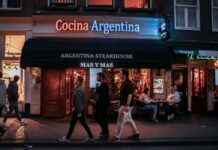In the wake of «XR» and about fifteen citizen collectives engaged in the fight for the protection of the environment, the demonstrators, gathered next to the Town Hall, on the Old Port, notably carried out a «die in», dressed in black and sometimes equipped with gas masks, lying on the ground to illustrate the human lives sacrificed by air pollution.
“2,500 people is like a small neighborhood that disappears every year,” denounced Nerf-Pique, representative of Extinction Rebellion and the Stop Cruises Collective, during a speech.
According to the European Environment Agency, Marseille greatly exceeds the regulatory limits in terms of nitrogen dioxide emissions, set at 40 µg/m3, with annual average rates of 79 µg/m3.
Among the demonstrators on Saturday, many came from the northern districts of the city, the most affected by this problem, such as Charles Chenut, president of Cap au Nord.
Regarding fine particle pollution, he said, «all WHO thresholds have been breached in the northern districts», close to cruise ship docks and shipyards, but also to the highway and polluting industries.
The Regional Health Agency has recognized in recent years «an environment that promotes health risks» in these neighborhoods.
In the Marseille metropolis, emissions of nitrogen oxides of maritime origin – 20% of which are due to cruise ships – exceeded road emissions for the first time in 2018, according to the AtmoSud organization.
If they see in the electrification of the quays and the tightening of the rules on matters of sulfur emissions from ships an improvement, the activists deplore «the diversion strategies of the companies, which for example to continue to use heavy fuel oil put particulate filters, and thus reject their emissions at sea», explains Chantal Rouet, of the collective «Respirer tue».
Saturday’s action brought together very different movements, from Greenpeace or Alternatiba to Marseille neighborhood committees, and should «have a follow-up», said Marie-Blanche Chamoulaud, from the federation of CIQs (neighborhood interest committees) of the 16th arrondissement.
«When you’re isolated you go around in circles a bit, getting together gives you the opportunity to think differently,» she said enthusiastically.














